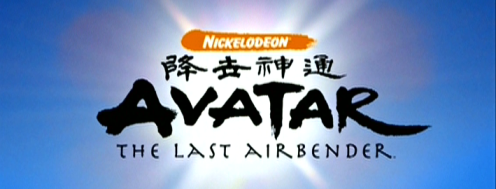Avatar: The Last Airbender (2005-2008): Created by Michael Dante DiMartino and Bryan Konietzko. Featuring the voices of: Zach Tyler Eisen, Mae Whitman, Jack DeSena, Dante Basco, and Mako Iwamatsu.
I know, I know—I don’t really review television on this blog, and I’m still in the midst of my Best Picture Countdown. But now that I’ve finished the 61 episodes that comprise Nickelodeon’s magnum opus, I feel compelled to share some general thoughts/sentiments about the experience (especially for you folks who convinced me to check it out in the first place). This will approximate more of a retrospective than a review, but hopefully you’ll humor me.
First, let me return to my initial exposure to this show—way back to high school days, when I was a huge fan (and still am) of SpongeBob SquarePants. And by 2005, that was the limit of my time spent on Nickelodeon.
So when I first saw the promotional ads for Avatar, I thought, “Oh look, another disposable anime knock-off!” To be fair, I resisted the very concept of anime itself, believing all animes measured up to the quality of Pokémon or Speed Racer (the current Miyazaki diehard in me can only bow his head in shame). I assumed the show would bomb. How could a show succeed when it starred an annoying bald kid shouting “Yip-yip!” to his flying luck-bison?
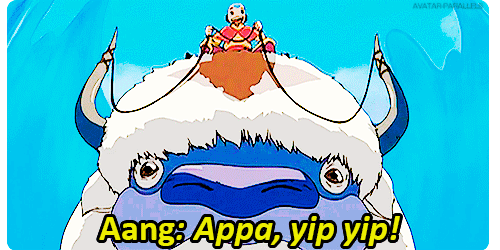
But that was youthful (and I admit, willful) ignorance. When I decided to finally watch the series this year, I cleared my mind of all preconceptions. And that was a good plan, because this show positively thrilled me on the purest, most primal level. I realize that’s not quite the analytical praise that I strive for (I’ll get into that later). But the show spoke to a younger, less cynical version of myself—with its wide swath of worlds, characters, creatures, action-adventure. The promise of a new episode, with its worlds and trials still untold, brought me a giddy joy I haven’t felt since, well…childhood.
I admire so much about the show, though I want to draw particular attention to its techniques of characterization. You think you have these kids pegged from the get-go. Aang is the naive jester, Katara is the maternal one, and Sokka is the lame comic relief, right?
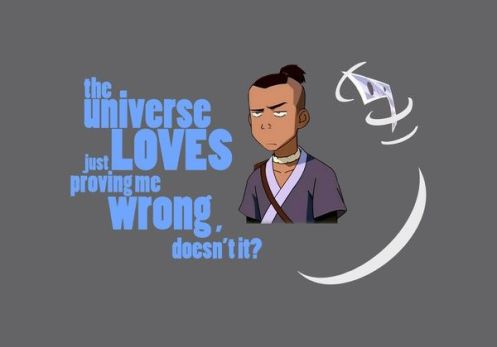
But the writers show us surprising yet inevitable complexities to these characters, because the television format gives them so much space to work with. Aang has a deep spiritual side to offset his mischievousness, Katara proves most susceptible to righteous indignation, while Sokka’s goofiness belies a keen perception and resourcefulness.
And the show goes beyond its main heroes to examine the motivations of its many villains; we usually understand (if not necessarily condone) their actions. Be it known, this is something very few television shows, for kids OR adults, ever get right.
I wish to stress this multi-dimensionality because Avatar throws us for a major loop on the macro-scale. The initial set-up of the four nations (Fire = Bad; Earth, Water, Air = Good) proves flimsy, as we begin to see good and evil manifested in all four nations. It’s a far cry from the usual set-ups of Saturday morning cartoons, with their predictable, binary teams of good and evil.
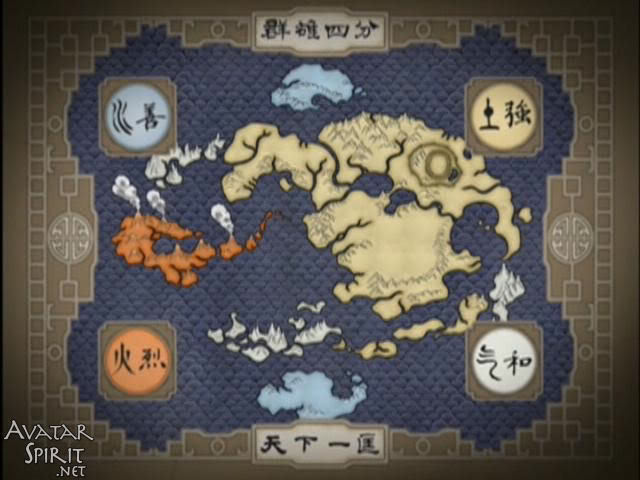
If the outlook of the show seems mature, the design and animation complement it handsomely. The design is definitely anime-inspired, but has a smooth look to it that borrows from American animation. It doesn’t fall into pure imitation—instead, there’s a deep respect for animation greats like Miyazaki and Don Bluth. We gain a deep respect for the animals (i.e., Miyazaki), many of whom are hybrids of familiar animals—yet these are less chimeras than graceful portmanteaus with their own identities (I have a special place in my heart Nyla, a doglike creature with the schnozz of a star-nosed mole).
I must also single out the combat sequences, which move with a fluidity that only animation can accomplish. Avatar transcends other animated adventures by incorporating martial arts with magic, when most shows are content with one or the other. Witness the final battle between Aang and the fearsome Fire Lord, and marvel at the sheer size and scope of its orchestration—it seems inspired by live-action epics, but transcends them with pure imaginative power.

We can’t expect a series with such ambition and scale to be a perfect one—fortunately, my quibbles with the series are minor in light of all its strengths. Much as it distinguishes itself from the pack, Avatar still retains some of the more irksome qualities of shows aimed at its target audience. While there’s a narrative through-line, one can’t but feel that certain episodes feel random and spontaneous in light of previous episodes. Our heroes are informed of the urgency of their mission in one episode, then decide they need some R&R in the next. We can also expect hit-or-miss humor, with quite a few misses in the early going. The jokes work best when they’re not forced, and play off the personalities we come to love.
Yet incredibly, none of those flaws dim the emotional satisfaction of this series. (In fact, its flaws may even be part of its charm.) While built upon things that “kids love” (Fights! Monsters! Relationships!), Avatar’s purpose is primarily spiritual, in the broadest possible sense. Many shows wallow in theirs characters’s success; shows like Avatar reminds us that failure is integral to that success.
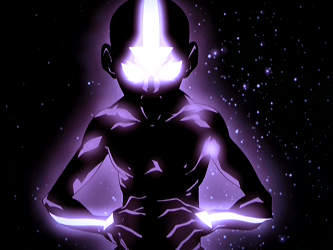
—The CineMaverick, 7/8/2014
